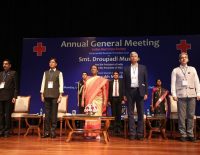Air pollution biggest contributor to lung diseases: Experts

Long-term effects of air pollution on lungs are very worrying. Around 30 years ago, Chronic Obstructive Pulmonary Disease (COPD) meant nothing. Today, COPD is one of the leading causes of deaths and a major reason is air pollution. The number of patients being admitted to emergency due to COPD diseases has also increased by over 20 percent due to air pollution. Household air pollution also causes deaths which not many people are aware of. Respiratory diseases have increased due to air pollution and there is an urgent need to control air pollution in summer months to ensure air pollution woes do not impact people in winter”, said Dr. GC Khilnani, Chairman, PSRI Institute of Pulmonary, Critical Care and Sleep Medicine, PSRI Hospital.
Dr Khilnani was speaking on the second day of the ‘Illness to Wellness’ Summit organised by ASSOCHAM Foundation for CSR. The industry experts shared their views on how air pollution has become a major source of lung diseases and also plays a major part in exacerbating other ailments
Dr. Vivek Nangia, Principal Director & Head, Institute of Respiratory, Critical Care & Sleep Medicine and Chief of Pulmonology, Max Healthcare, said, “Air pollution also plays a part in aggravating existing ailments. For instance, with diabetes, a co-relation has been found with the duration of exposure to air pollution. So far we have attributed rise in diabetes patients to lifestyle issues, obesity and diet issues. But now, a very preventive risk factor that is coming into play is air pollution. Studies have found that there has been a rise in diabetes patients after being continuously exposed to rising levels of air pollution. Sleep apnea is another big issue that people are facing to air pollution.”
The ASSOCHAM Awareness Summit aims to disseminate information on identified and critical health-related issues, thereby fostering overall well-being. The Summit featured more than 60 distinguished specialists and wellness professionals from the country. They shared their insights on various topics across nine sessions which delved into a range of subjects such as healthcare workforce strengthening, nutrition, women’s health, mental health, sickle cell diseases, Ayush, elderly care and the digital healthcare landscape.








Comments